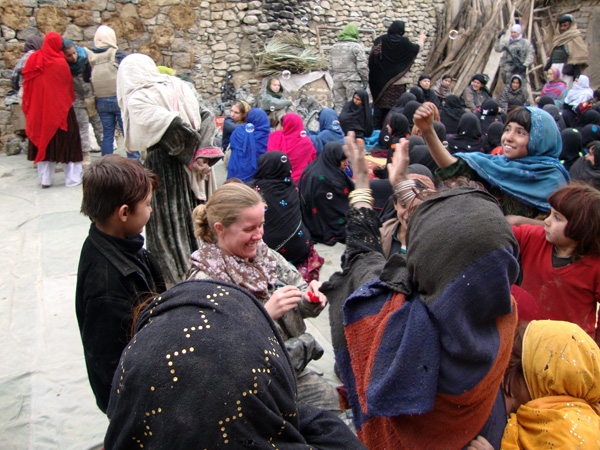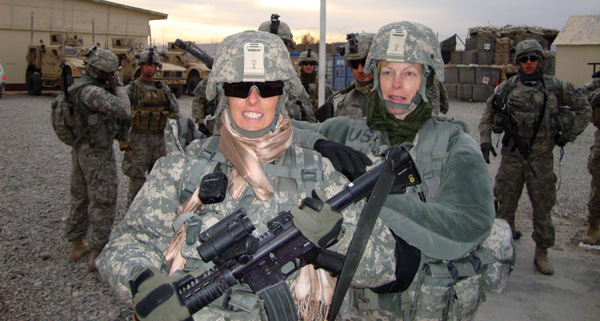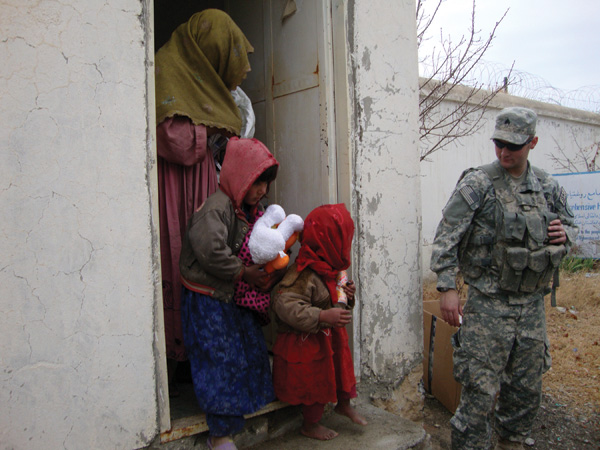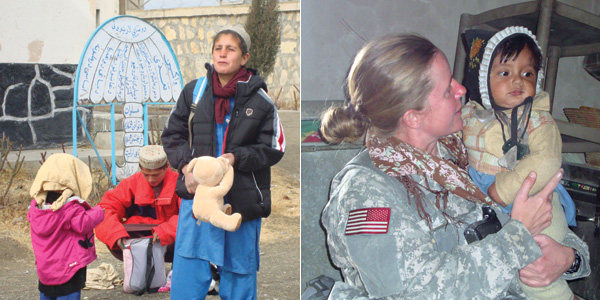Editor’s Note: Marilyn Moores is our featured Judge in this issue’s SIDEBAR. At our request Judge Moores, who is also a Lieutenant Colonel in the Indiana National Guard, wrote this article on her recently completed tour of duty in Afghanistan.

Taking a year off from the bench of the Marion County Superior Court Juvenile Division to do a year of active duty military service in Khost, Afghanistan was one of the most exciting experiences of my life. As a JAG (Judge Advocate General, the army’s lawyers), I had spent my entire 25-year career in the Indiana National Guard mobilizing citizen soldiers—preparing their wills, powers of attorney and attending to their families’ legal issues during their soldier’s absence. Now I was going to be one of those soldiers.
My unit, the 3-19th Agribusiness Development Team (ADT), was formed a year before we left for Afghanistan in September, 2010 and trained together as a unit for that year not only in warrior tasks (marksmanship, land navigation, grenade throwing, mine deployment, etc.) but also in primitive farming skills like plowing with oxen and draft horses, blacksmithing, and wool spinning. I was the large animal husbandry specialist because my husband and I have a small horse farm. Six of the 62-person unit were women and we formed a female engagement team to interact with Afghan women.

Khost is one of Afghanistan’s easternmost provinces, right next to the Pakistan border and south of Kabul. There we lived on FOB (Forward Operating Base) Salerno, home to 3,000 Army, Navy, Air Force, Marines and civilian contractors. Salerno is nicknamed “Rocket City” for the weekly shellings we received from Taliban troops in Pakistan.
Not long after we arrived in country, I went to work at the Brigade headquarters’ Rule of Law section where we worked with Khost provincial and district government to mentor local judges and prosecutors and further the development and implementation of local government. Khost had a working court system—something not true of all other provinces. We helped establish a system whereby Khost court decisions were published on the web, not only in Pashtu but also in English. We helped conduct training for the judicial officers in a newly issued judicial code of conduct. We helped bring vocational training to the local prison to better reintegrate offenders after their release. We helped strengthen security at the provincial court house which also contains judicial housing for security reasons.
But perhaps most rewarding were the women’s missions we conducted with the PRT (Provincial Reconstruction Team). Afghan women officials were in as much danger as, if not more than, the male officials. So when the Director of Women’s Affairs wanted to visit a remote district capital, Jaji Maidan, to conduct a shura we escorted her and her staff and attended the meeting with Jaji Maidan’s women to find out what they wanted from their government and what issues and concerns they had. The shura was addressed by the young male district governor, after he received permission from the village elders, an event that made headlines all over Afghanistan for its innovation.

The women expressed the need for more women’s healthcare—not surprising given that one in nine Afghan women die in childbirth and the average life expectancy for a woman is only 42 years. They were concerned that many of the villagers had diarrhea, later determined to be caused by the lack of sanitary sewers and shallow wells for drinking water. They wanted more education about their legal rights. Their lack of knowledge was not surprising considering that only 23% of Afghans are literate and of that 23%, only 7% are women. All of the women were very concerned about the Americans leaving their country fearing a return to the dreaded days of the Taliban when they were not allowed to be educated or even leave their homes without appropriate male escorts.
As I left Afghanistan we were planning to engage Afghan women attorneys from Kabul to visit small, remote villages like Jaji Maidan to educate Afghan women about their legal rights guaranteed by the Afghan constitution—that they cannot be forced to marry someone, that their dowries are their property and not their families, and that females under the age of 16 cannot marry. I am hopeful this project was approved and is being undertaken.

We found the Pashtun people most warm and friendly, and the ultimate hosts/hostesses. Tea and biscuits (cookies to us) were served at every meeting. They are also exceedingly generous and kind. We formed lifelong friendships with our interpreters and other Afghans with whom we worked. And after spending an entire year there, it was heart-wrenching to have to leave, knowing the communication gulf that would ensue. Afghanistan has no postal system. There are no hard-wired electrical or telephonic grids outside of Kabul. The most common method of distance communication is by cellular phone, and even this is haphazard at best because of all the interference caused by the mountains.
And it was hard to leave with so much still to be done. I wanted to see it through to completion. There is much reason to be hopeful—75% of the population is under the age of 21—and we have been there for 10 years, so we have had a huge influence on a large portion of the young population. Children—both boys and girls—are attending school in droves, because their parents see the advantages of an education. Cottage industries are flourishing, even among women. But the Taliban remains a force to be reckoned with, always lurking in the lawless tribal areas of northern Pakistan, just waiting for an opportunity. It would break my heart to see all the progress gone overnight because we did not stay the course.